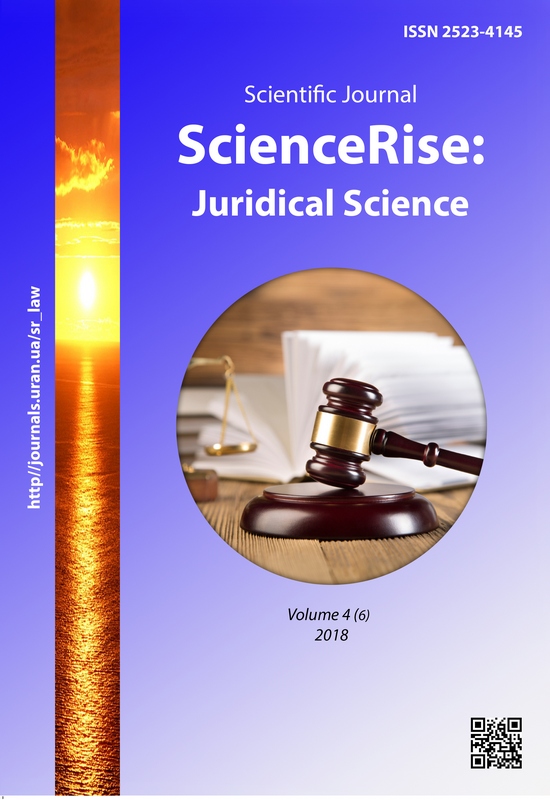Legislative definitions of security: general and theoretical aspects
DOI:
https://doi.org/10.15587/2523-4153.2018.153485Keywords:
law definitions, legal definitions, types of legal definitions legislative definition of «security»Abstract
The article deals with the general theoretical characteristics of legislative safety definitions in the context of the allocation of their general and special features. Common features are inherent in all definitions, legal definitions and legislative security definitions in particular. Special features distinguish them from other legislative definitions and are constructed, mainly, in a classical manner by generic type principle.
The general features of the legislative definitions of safety include: legal nature, intellectual orientation, connection with other normative-legal requirements, allocation and formulation of features of the phenomenon, scientific validity, mediated form of their implementation, etc. Special features are divided into generic (state, measure, lack, characteristic, property, protection, ability, boundary, process, activity, compliance) and specific (any risk, unacceptable risk, marginal risk, threats, civil aviation, air transport, radiation exposure, norms, rules, standards, interests of man and citizen, society and state, information, state sovereignty, territorial integrity, democratic constitutional order, drugs, radiation-nuclear facilities and the environment, influence on employees, staff).
It is indicated in the expediency of formulating one or another legislative definition of security, which consists in the need to find out in what meaning the term of safety in the normative legal document is used: commonly used; special – inherent in a certain field of special knowledge; specifically legal. The requirements for legislative safety definitions are defined, in particular they must: contain the main (general and distinctive) features of phenomena or processes being formulated; be reasonable and expedient, aimed at achieving the goals envisaged by law, adequate for both social reality and for the requirements of legislative technique aimed at satisfying the needs of legal practice
References
- Rishennia Konstytutsiynoho Sudu Ukrainy u spravi za konstytutsiynym podanniam 51 narodnoho deputata Ukrainy shchodo vidpovidnosti Konstytutsiyi Ukrainy (konstytutsiynosti) polozhen statti 92, punktu 6 rozdilu Kh «Perekhidni polozhennia» Zemelnoho kodeksu Ukrainy (sprava pro postiyne korystuvannia zemelnymy diliankamy) vid 22 veresnia 2005 roku No. 5-rp/2005 (2005). Ofitsiynyi visnyk Ukrainy, 39, 2490.
- Interinstitutional agreement of 22 December 1998 on common guidelines for the quality of drafting of Community legislation (1999/C 73/01) (1999). Official Journal of the European Communities, 42, 73.
- Khvorostiankina, A. V. Definitsiyi v zakonodavchykh tekstakh: pytannia teoriyi. Ministerstvo Yustytsiyi Ukrainy. Available at: https://minjust.gov.ua/m/str_6669
- Kosovych, V. (2013). Pravovi definitsiyi yak zasib zabezpechennia stvorennia doskonalykh normatyvno-pravovykh aktiv Ukrainy. Visnyk Lvivskoho universytetu. Seriya yurydychna, 57, 43–52.
- Dashkovska, O. R. (2012). Pravovi definitsiyi yak riznovyd normatyvnykh prypysiv. Visnyk Akademii pravovykh nauk Ukrainy, 3 (70), 16–23.
- Palashevskaya, I. (2017). Legal Definitions: Functional and Typological Characteristics. Vestnik Volgogradskogo Gosudarstvennogo Universiteta. Seriya 2. Jazykoznanie, 16 (3), 131–141. doi: https://doi.org/10.15688/jvolsu2.2017.3.13
- Podorozhna, T. S. (2009). Zakonodavchi definitsii: poniattia, struktura, funktsiyi. Lviv: PAIS, 196.
- Doroshchuk, M. Z. (2016). Legal definitions «speciality» and «specialization» and use of their for legal regulation of staffing healthcare in Ukraine: theoretical and legal analysis. Molodiy vcheniy, 12.1 (40), 581–587.
- Kashanina, T. V. (2007). Yuridicheskaya tekhnika: ucheb. Moscow: Eksmo, 437.
- Pan'ko, K. K. (2011). Teoriya i praktika zakonotvorchestva v ugolovnom prave. Moscow: Yurlitinform, 312.
- Khvorostiankina, A. V. (2008). Vyznachenist zakonodavchykh definitsiy yak umova efektyvnoho dotrymannia dukhu ta bukvy zakonu. Naukovi zapysky NUKMA, 77, 8–12.
- Gubaeva, T. V. (2010). Yazyk i pravo. Iskusstvo vladeniya slovom v professional'noy yuridicheskoy deyatel'nosti. Moscow: Norma: Infra-M, 176.
- Hayretdinova, M. D. (2008). Zakonodatel'naya definiciya: problemy teorii i praktiki. Nizhniy Novgorod, 189.
- Vlasenko, N. A. (2009). Sudebnye pravovye definicii: priroda, funkcii, osnovaniya deleniya i vidy. Zhurnal rossiyskogo prava, 12, 58–67.
- Voplenko, N. N., Davydova, M. L. (2001). Pravovye definicii v sovremennom rossiyskom zakonodatel'stve. Vestnik Nizhegorodskogo universiteta im. N. I. Lobachevskogo, 1, 64–71.
Downloads
Published
How to Cite
Issue
Section
License
Copyright (c) 2018 Denys Tykhomyrov

This work is licensed under a Creative Commons Attribution 4.0 International License.
Our journal abides by the Creative Commons CC BY copyright rights and permissions for open access journals.
Authors, who are published in this journal, agree to the following conditions:
1. The authors reserve the right to authorship of the work and pass the first publication right of this work to the journal under the terms of a Creative Commons CC BY, which allows others to freely distribute the published research with the obligatory reference to the authors of the original work and the first publication of the work in this journal.
2. The authors have the right to conclude separate supplement agreements that relate to non-exclusive work distribution in the form in which it has been published by the journal (for example, to upload the work to the online storage of the journal or publish it as part of a monograph), provided that the reference to the first publication of the work in this journal is included.








